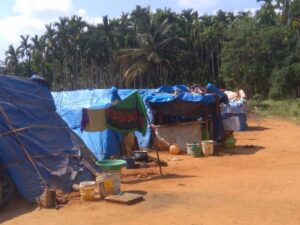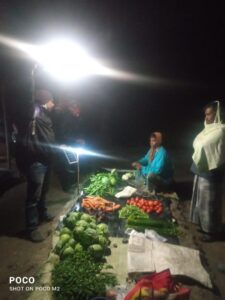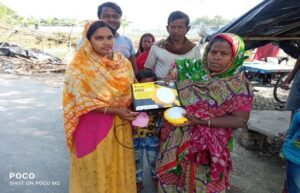 Lack of access to clean energy is a major challenge among the marginalised and vulnerable sections of the population, both in rural and urban areas across the country. Migrant workers, construction workers, and a host of other informal workers living in temporary shelters bear the brunt of the heat, cold, and darkness. Despite the fact that most of India is electrified, unfortunately it does not extend to informal temporary settlements and low-income neighbourhoods where communities live with make-do homes. Millions of households in such habitats rely on kerosene, biomass, paper and cardboard waste for fuel to cook, light up their temporary shelters and also keep them warm. The day in one such typical shelter ends much earlier than its nearest counterpart, which has access to electricity for a simple light bulb. The women in such households spend a lot of time just sourcing the fuel to the shelter and to cook a meal. About 31% of Indian households use kerosene for lighting (Government of India Census, 2011). These fuel sources are hazardous, expensive, provide little heat and light and detrimental to the health of communities, particularly women and children. They also are a constant threat of fire risk.
Lack of access to clean energy is a major challenge among the marginalised and vulnerable sections of the population, both in rural and urban areas across the country. Migrant workers, construction workers, and a host of other informal workers living in temporary shelters bear the brunt of the heat, cold, and darkness. Despite the fact that most of India is electrified, unfortunately it does not extend to informal temporary settlements and low-income neighbourhoods where communities live with make-do homes. Millions of households in such habitats rely on kerosene, biomass, paper and cardboard waste for fuel to cook, light up their temporary shelters and also keep them warm. The day in one such typical shelter ends much earlier than its nearest counterpart, which has access to electricity for a simple light bulb. The women in such households spend a lot of time just sourcing the fuel to the shelter and to cook a meal. About 31% of Indian households use kerosene for lighting (Government of India Census, 2011). These fuel sources are hazardous, expensive, provide little heat and light and detrimental to the health of communities, particularly women and children. They also are a constant threat of fire risk.
In India, 65 million people are living in informal urban settlement communities (Government of India Census, 2011). The number of poor people in India is estimated to have increased by 75 million due to the detrimental impacts of COVID-19, accounting for nearly 60% increase in global poverty (PEW Research, 2021). People in marginalised settlements live in basic tent shelters without electricity, clean water, or air and struggle to make ends meet. These families are trapped in intergenerational cycles of poverty, compounded by gender inequality and a lack of access to reliable, affordable, clean energy. Intersectional poverty further leaves women with little resources to cope.
Women in India have traditionally been a marginalised group, vulnerable to the risks associated with intersectional and multidimensional poverty. Women largely bear the brunt of having to collect firewood, water, cooking, caring for the young and old. A large part of their time is spent in just accessing fuel and water. In urban areas, too, sights of women carrying firewood are not rare. More than half of the work done by women in India is unpaid, with most of it informal and unprotected. Women spending long hours cooking and, particularly when using low-quality household solutions for lighting and cooking, further has serious impacts on their health and well-being. The toxic, harmful smoke generated while using kerosene for lighting significantly impacts women and children. There are over 4 million premature deaths per year due to exposure to indoor air pollution. Often unable to cope with the many household pressures, women are also restricted to informal, poorly paid jobs. The 2021 World Bank report observes that at 19.9%, India’s women’s labour force participation rate (LFPR) is already among the lowest globally, and it continues to decline.
 However, in recent years, it has been seen that access to simple, low cost innovative, clean energy lighting has started to make life much easier for women and has begun to initiate positive transformations in their lives and livelihoods. Access to a simple light at home makes cooking easy, and her day can extend by a couple of hours. A simple light to continue vending extends the possibility of work hours that helps earn a few more rupees on a daily basis.
However, in recent years, it has been seen that access to simple, low cost innovative, clean energy lighting has started to make life much easier for women and has begun to initiate positive transformations in their lives and livelihoods. Access to a simple light at home makes cooking easy, and her day can extend by a couple of hours. A simple light to continue vending extends the possibility of work hours that helps earn a few more rupees on a daily basis.
The clean, innovative, easy to handle solar lamp has made a big difference in the lives of many. Efforts by the government, civil society and other organisations have enabled people living in makeshift tarpaulin tent communities to cease using kerosene lanterns, which produce toxic black carbon and shift to low cost, innovative and clean energy for basic lighting purposes and most importantly found ways to empower women.
“A few years ago, none of us even knew about solar power. We relied on kerosene lamps to have some light in our homes. Fans were something we couldn’t even dream of in the absence of electricity. Kerosene is quite expensive if we don’t stand for hours at the ration shop. Despite this, it was not enough for our children to study or for life to go on after sunset. Today, not only do we have lights and fans at home, but we are also saving a lot of money because we only need to invest once in these products,” shared Sharanamma, a resident from a low-income neighbourhood in Bangalore who has benefitted from the interventions of Pollinate Group, an organisation working in India and Nepal since 2012.
In India, communities at the base of the pyramid are among the most vulnerable, with minimal access to reliable and affordable energy sources. Providing women from marginalised communities with access to innovative digital technology and the skills, capital, and mentoring they need to become change agents who bring affordable clean energy and household products to meet communities’ needs has been a major effort in helping women access energy and help improve quality of life. This has helped them earn a stable income and help their communities to improve their health by transitioning from traditional biomass to clean-energy products. Such entrepreneurship models not only empower women but equips communities to move out of poverty in the long term, simultaneously bridging economic and digital divides.
 Such an effort has helped bring life-changing opportunities to many households, especially those living on less than $1.90 per day. The solar lamp has an ROI of 25 weeks for the family, and provides a minimum of 5 years of light. Each solar product has saved families US$85/pa (15% of income), increases productivity, working hours and children’s study time, thereby eliminating kerosene, wood, biomass and the toxic fumes that otherwise fill the households. Raising awareness among women on the access to clean and affordable lighting and its benefits, followed by making women entrepreneurs to sell the innovative, clean and affordable light has helped women in providing them extra time, better quality of life, improved indoor environment for better health, provided agency to advocate for women’s access to basic lighting and energy and more importantly has provided economic independence.
Such an effort has helped bring life-changing opportunities to many households, especially those living on less than $1.90 per day. The solar lamp has an ROI of 25 weeks for the family, and provides a minimum of 5 years of light. Each solar product has saved families US$85/pa (15% of income), increases productivity, working hours and children’s study time, thereby eliminating kerosene, wood, biomass and the toxic fumes that otherwise fill the households. Raising awareness among women on the access to clean and affordable lighting and its benefits, followed by making women entrepreneurs to sell the innovative, clean and affordable light has helped women in providing them extra time, better quality of life, improved indoor environment for better health, provided agency to advocate for women’s access to basic lighting and energy and more importantly has provided economic independence.
Integrating energy access with women empowerment is a key part of ensuring access to energy for women. From the experience of talking to many women entrepreneurs supported by Pollinate, it was evident that as community members, women entrepreneurs working on such projects know their customers thoroughly and how to support household domestic and economic activities and improve family health and savings. Furthermore, in India, entrepreneurship skills, zero cost inventory of clean energy products, and provision of livelihood opportunities to women from marginalised urban settlement communities plays a major role in advancing many of the SDGs too. It is also rewarding to practice inclusion and diversity at all levels and know that it is key to empower all women in communities who want to be entrepreneurs, regardless of their literacy levels, ability, or background.
Akshatha Venkatesha works as Assistant Manager – Fundraising with the Pollinate Group
Centre for Financial Accountability is now on Telegram. Click here to join our Telegram channel and stay tuned to the latest updates and insights on the economy and finance.
